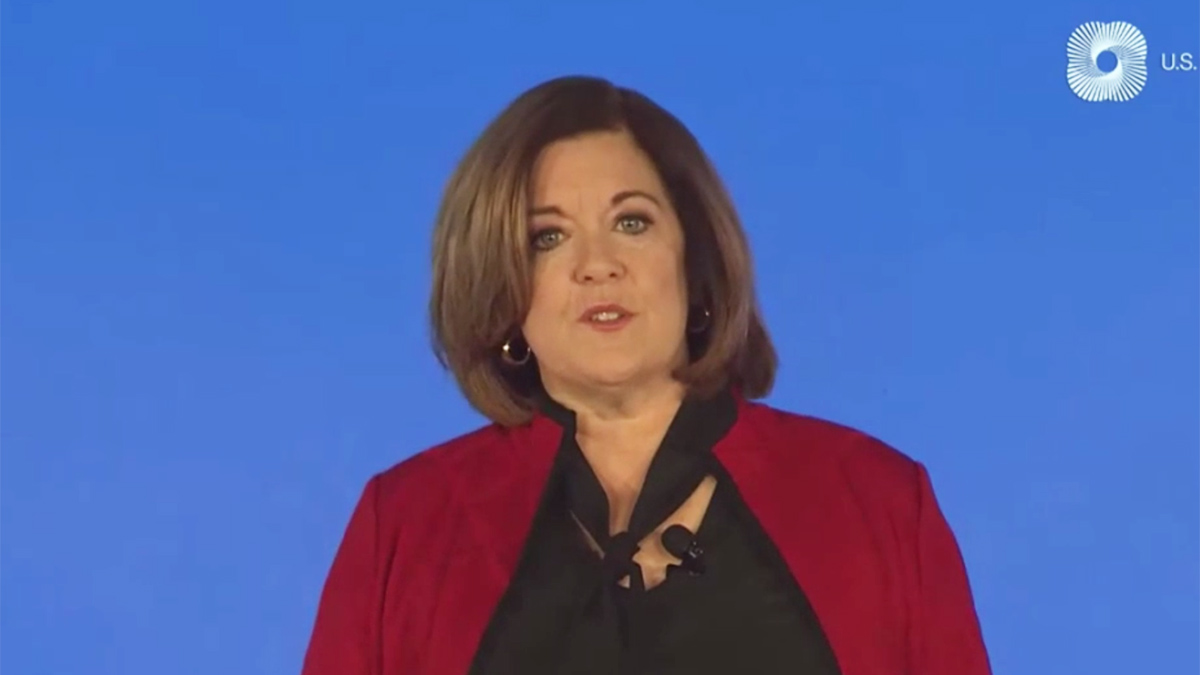U.S. Chamber CEO slams anti-trust actions, partisan divides
U.S. Chamber CEO slams anti-trust actions, partisan divides
- January 12, 2022 |
-
 Walt Williams
Walt Williams


Chamber's chief policy officer says members of Congress who voted against certifying presidential election will be judged by the "totality of their actions"
In her first State of American Business address as CEO of the U.S. Chamber of Commerce, Suzanne Clark defended large corporations from critics who say they hold too much market power and urged "business advocates" to push back against extreme partisanship in politics.
Want more news?
CEO Update membership gives full access to the latest intelligence on association management, career advancement, compensation trends and networking events, as well as hundreds of listings for senior-level association jobs.
CLICK HERE FOR MEMBERSHIP DETAILS.
Clark's roughly 20-minute speech Tuesday touched on a wide range of topics but emphasized the Chamber's opposition to more government regulation and higher taxes on businesses. The annual event was held virtually this year, with the CEO speaking from a stage while a large screen behind her projected images illustrating talking points.
"Despite the clear innovation, the resilience and the dynamism of our economy, we have leaders who think the government needs to step in and impose a heavy hand," Clark said. As an example, she cited a 2021 executive order by President Joe Biden ordering federal regulators to explore using anti-trust law to promote business competition.
"Modern-day trustbusters on Capitol Hill from both parties think all big is bad and necessarily a threat to small when, in fact, our economy is an ecosystem where big business depends on small companies and vice versa," she said. "They're each other's vendors, suppliers, customers and partners. And they each employ the consumers who keep the entire system afloat."
Talking politics
Clark became CEO in March 2021, succeeding Tom Donohue, who led the organization for roughly a quarter of a century when he stepped down. She inherited a business group that has faced questions about its relevancy in recent years, particularly about its continued importance to Republicans.
Clark's address called out the Biden administration on economic policies and lambasted the deep partisanship that defined modern politics, but she didn't name any specific individuals or point fingers at either party. She instead called for a "new movement" of business advocates "who dare to find the common ground."
"Our democracy is strongest when candidates and elected officials are focused on winning people over to their ideas and on the merits of those ideas, not merely relying on the support of those who already agree with them," she said. "Politicians should compete for public support with their platforms, persuading more voters, and then building broader coalitions to turn those good ideas into good policy."
In a press conference later in the day, Clark and Chief Policy Officer Neil Bradley were asked whether the Chamber would continue to financially support Republican lawmakers who contested the results of the 2020 presidential election. The business group had hard words for those lawmakers following the last year's attack on the U.S. Capitol, but so far that stance hasn't been reflected in its spending.
"What we said was that we would judge members of Congress by the totality of their actions," Bradley said. "It wasn't just the question of a vote that evening but all the things that led up to the events of Jan. 6, and then what policymakers have been doing since then either to build trust in our election system and institutions or erode it."
Immigration and trade
Still, Clark mostly stuck to economic policy in her address. Some highlights:
- The current workforce shortage is a crisis that could be partly addressed through a less restrictive immigration policy, she said. The Chamber wants to double the number of people who can legally immigrate to the U.S. and find a permanent solution for people who were brought illegally in the U.S. as children, known as "Dreamers."
- The U.S. needs to be more aggressive in forming new trade agreements with other countries, Clark said. "The U.S. has not entered an agreement with a new trade partner in a decade. And the current administration, consumed by caution and internal reviews, is doing little to change that."
- The CEO reiterated the Chamber's opposition to higher business taxes, such as those proposed in the Build Back Better Act being pushed by the Biden administration. "We need a domestic tax code that does not put U.S. companies at a disadvantage, as some propose to do with the highest corporate tax rate in the industrialized world," she said.
